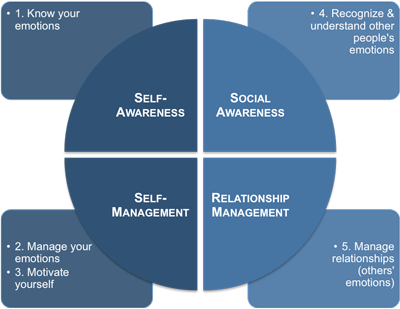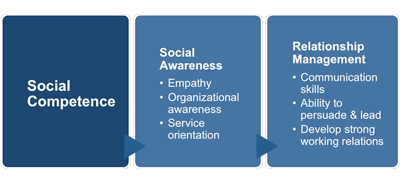What is Goleman's Model of Emotional Intelligence?
The five domains of Goleman's EQ model have become the de facto standard as far as applying emotional intelligence in the workplace is concerned. Many business-orientated models represent these five domains in four quadrants: two represent personal competence and two represent social competence.
 |
Personal Competence
This area of competence is concerned with three of the five 'domains' Goleman referred to and is split into two quadrants: self-awareness and self-management.
Self-awareness - means that you understand how you feel and can accurately assess your own emotional state.
There are three components to this quadrant: self-awareness, accurate self-assessment, and self-confidence. Self-assessment includes understanding your own strengths and weaknesses. It is also about being willing to explore them both, either by thinking about them yourself or by discussing them with others. Self-confidence is the ability to ground oneself so that you are secure and self-assured in whatever situation you may find yourself.
Self-management - builds on the understanding that you gained with self-awareness and involves controlling your emotions so that they don't control you. This could equally be called self-control - in other words how you regulate to maintain your equilibrium in the face of any problem or provocation you may face. It looks into how trustworthy and conscientious you are, as well as how you motivate yourself to achieve, taking into account your level of commitment and optimism.
Social Competence
This area of competence is concerned with Goleman's remaining two 'domains': social awareness and social skills. These skills look at how well you manage your relationships with others, including their emotions.
Social awareness - involves expanding your awareness to include the emotions of those people around you. It includes being able to empathize with others and being aware of how the organization that you are working in affects them. This covers your ability to read the emotional environment and power relationships you encounter in your role.
 |
Relationship management - means using an awareness of your own emotions and those of others to build strong relationships. It includes the identification, analysis, and management of relationships with people inside and outside of your team as well as their development through feedback and coaching. It also incorporates your ability to communicate, persuade, and lead others, whilst being direct and honest without alienating people.
Before exploring the different models used to measure your EQ it is worth knowing more about the origins and limitations of this area of psychology, as it is still very much a 'work in progress.'
You may also be interested in:
Understanding Emotional Intelligence | Emotional Quotient (EQ) and IQ | EQ and Management | EQ Timeline | Can EQ be Developed? | Personal Competence | Social Competence | EQ Framework.



